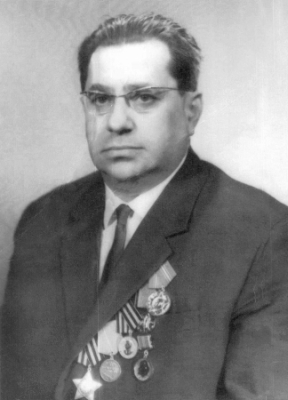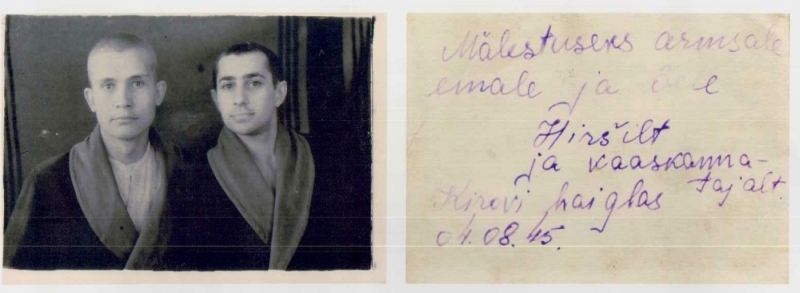 Mälestused-Jutustused
Mälestused-JutustusedВоспоминания/Рассказы
Memoirs/Stories
 Mälestused-Jutustused
Mälestused-JutustusedHirsh Sherman
(30.6.1925 - 17.10.1987)
Victory Day
Translated from Estonian Ilona Sherman, author's daughter

The night was quiet and calm, as usual. Some of us slept, others dozed, and those who couldn't fall asleep lay quietly pondering. I was among those injured who were given a shot of morphine each night at around 9 o’clock to subdue the phantom pains for a few hours, so I could get some sleep.
In our patient room there was always a so called “Medical Attendant”, who was usually one of the previously injured soldiers on their way to recovery and strong enough to care for the bedridden patients. There were many of these "Medical Attendants" in the hospital, who were charged with watching over us in the hospital rooms. The Medical Attendant/soldier who was on duty that night happened to doze off while he was sitting on a chair, and just like the rest of us, he did not know much about what was happening at that moment.
All of a sudden, we heard yelling and screaming from outside of the window. We thought it was shooting and automated gunfire, which didn't quiet down for a long time. But, actually it was people screaming "hooray" and yelling various patriotic slogans, dancing and singing loudly to the tune of a guitar and accordion. As a result, of all this noise, the injured soldiers who just fell asleep with great difficulty, awoke.
We didn't immediately realize what was happening. Our first thought was that our hospital was under attack by bandits, the so called “forest brothers” (lesnye brat’ya). [Forest brothers (Lesnye brat’ya), were local Estonian, Latvian or Lithuanian people who acted as partisans to help the Nazi’s towards the end of WWII. (IS)]. There had been attacks on military hospitals in Rezekne in the past, which caused a lot of damage. And so we decided that our time has come. Just at that moment one of the nurses ran into our room and yelled out loud: "GUYS, THE WAR IS OVER! TURN ON THE RADIO!"
We rarely turned off the radio; it played virtually around the clock. But, on this particular night somebody decided to turn off the black radio satellite dish, so we did not hear the unscheduled broadcast in the middle of the night. This is how things usually happened, exactly at that moment when... When we finally turned on the broadcast, we heard the final chords of the national anthem. However, this was enough for us to understand that something important really did happen, because at that hour, the radio was usually silent. And if something important was to happen, the only thing it could have been, was the end of the war. We always knew the latest updates from the Soviet Center of information. And in the last few days, they were suggesting that the war may end any day now. A large part of Germany was destroyed, Berlin fell, and then the German Army, as well as the civilians were all in great panic. Our troops kept on and were getting closer to the end of this terrible war. And that’s exactly the way it was. On the radio it was announced that the war had finally, and mercifully, come to an end.
At first we all felt lost. Then there was silence, and we just stared at each other. And only after that the reaction kicked in of the long awaited and hard won victory. In the bed next to mine, lay a soldier who, just like me had lost one leg and his other one was badly injured. His name was Vanya Zotov, he was just a year older than me. [The author was 19 years old at the time. (IS)] He couldn't contain himself and broke down in tears. Immediately after, a second soldier began sobbing, than a third, and a few minutes later the rest of us were crying hysterically. And none of us could figure out at that very moment, whether we were sobbing over our joy of victory or over our own individual injuries and misfortunes that the war had brought us. Most definitely, the overwhelming feeling of joy that the war has come to an end was there, but at the same time the feeling of personal pain and loss had been no less than those feelings of joy. We were all so young and full of life as young people always are, even during the war. And since the war had preserved our lives, than after the war each of us still wanted to live full, healthy, and normal lives. How do you live the rest of your life as a crippled invalid? This, none of us could even begin to imagine. What kind of interests and life activities would we be able to have? This too, no one could begin to envision. How were we going to be able to deal with our lives?

Before the victory, I was able to contain myself. I did not allow my mind to take over and take away my will and desire for life and work. I wasn't grieving so much about what was lost, but wanted to preserve and focus on what was left. I dreamt of life, of the future, I believed that everything would be okay, had to be okay and that allowed me mentally to be in decent shape. It also kept my will strong, gave me hope for getting better and a belief that life will go on. They say that the wounds of the victorious soldier heal faster than those of the soldier who lost. They attribute it to the emotional state of your mind. However, this day, the day of victory, I was sobbing like everyone else.
Shortly there after, the hospital staff came into our room to congratulate us with the ending of the war, their visit had made us break down in tears yet again. We got excited and emotional once more and our tears were a mixture of joy and sorrow. Some of us succumbed to feelings of desperation and it was almost impossible to calm those soldiers down. The hospital staff and medical personnel had thanked us for our contribution and active service in this difficult war. They tried to comfort and calm us by saying that there are still many more misfortunate people in this world. But of course, at that moment those words could not calm us down. When they left, each one of us began to gradually relax, and soon the room was silent again. All day each of us were in deep thought and remained within themselves. We didn't say much even to each other. I lay in my bed and was thinking of my own misfortune and that of my comrades and tried to come to terms with the fact that whatever we have is now inevitable and we have to accept it. The difficulty of the situation was not only emotional pain, but also the excruciating physical pains that were tearing us apart. We all felt bad. Very bad. Terrible!
I will not try to describe some one else’s pain, I had enough of my own, but when I was able to calm down a little bit and focus on my thoughts, I realized, that, for the first time in my life, there is such grief and sorrow in this world that no amount of tears will ever be able to wash it away. We knew at that time of Hitler's and Nazi's crimes in general terms. However, even that was enough to understand the turnaround that had just happened to the world. Only after the war, when historians, economists, lawyers, and specialists had tallied up the total consequence of the crimes into numbers, we had a sad statistical report.
But we will talk about this in the next chapter.